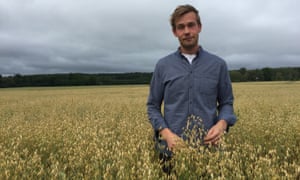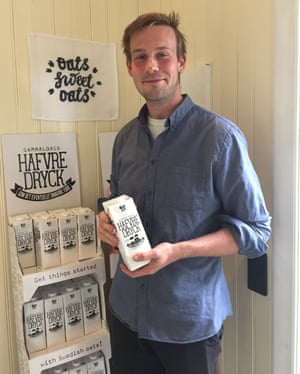https://www.theguardian.com/sustainable-business/2017/aug/26/wow-no-cow-swedish-farmer-oats-milk-oatly
Adam Arnesson, 27, is not your usual milk producer. For starters, he doesn’t have any dairy cattle. Our first photo opportunity is in the middle of one of his fields of oats.
Until last year all these oats went into animal feed, either sold or fed to the sheep, pigs and cows he rears on his organic farm in Örebro county, central Sweden.
With the support of Swedish drinks company Oatly, they are now being used to produce an oat milk drink – tapping into the growing market for dairy alternatives across the country.
Livestock still provides most of the income of the 80ha farm Arnesson runs in partnership with his parents. But he wants that to change.
“The natural thing for us would be to increase our livestock numbers, but I don’t want a factory,” he says. “The number of animals has to be emotionally right so I know each of them.”
Instead, Arnesson wants to grow more protein crops, such as oats, and sell them for human consumption rather than for feeding to livestock to produce meat and dairy.
The rearing of livestock and meat consumption accounts for 14.5% of global greenhouse gas (GHG) emissions. Alongside carbon emissions from deforestation (for pasture or crops to feed animals), the livestock sector is also the single biggest human-related source of methane (from cattle) and nitrous oxide emissions (from fertiliser and manure), two particularly potent greenhouse gases.
On current trends, by 2050 we will be growing more crops to feed directly to animals than ourselves. Even small shifts to feeding crops to humans instead of livestock would lead to significant increases in food availability.
One company promoting itself heavily on the back of its claim to be tackling this issue has been Oatly. It has been causing controversy – and has even been the target of legal action from a Swedish dairy trade group – with its outspoken attacks on the dairy sector and its related climate emissions.
Ditch the cows, drink oat milk and save the planet, has been the gist of its marketing messaging, which has included a promotional video of CEO Toni Petersson singing “Wow, no cow’ in a field of oats.
Petersson says the company is just “telling people what the science tells us about the need to consume more plant-based foods”.
The Swedish Food Agency – while it highlights the benefit of grazing animals for producing a “rich agricultural landscape” in the country – warns people against consuming too many dairy products, due to the climate impact of methane gas emissions from cows.
However, Arnesson says many farmers in Sweden believe Oatly is demonising dairy farmers.
“I had a lot of arguments on social media with other farmers, because I thought what Oatly was doing could bring better opportunities to our sector,” says Arnesson, who decided to contact the company in 2015 to see if they could help him switch away from livestock.
For Oatly, the timing was ideal. It buys its oats from a wholesaler as it says it does not have the scale to mill and process itself, but saw Arnesson as an opportunity to demonstrate how it could help transition farmers away from livestock farming.
By late 2016, Arnesson had his own limited edition range of Oatly-branded oat milk complete with a national video campaign.
“Quite a lot of farmers had a bad image and perhaps even hated us,” says Cecilia Sjöholm, head of communications at Oatly. “But we’re very much pro-farmer.” Petersson adds: “We want to be a catalyst company. We can help farmers move away from animals to plant production.”
So far, Arnesson says, he has faced little hostility from his neighbours for collaborating with Oatly. “It was kind of surprising but other dairy farmers have been to my [farm] shop and like the oat milk. One came and said he likes cow’s milk and oats too. It’s a Swedish thing to eat oats. The anger is not as strong as it seems on Facebook.”
The company played upon the heritage of oats in the Swedish diet by branding Arnesson’s limited edition range as “Gammeldags Hafvredryck” (Swedish for old-fashioned oat drink) because of his use of a less commonly grown oat variety.
After the first year of producing oats, analysis by researchers at the Swedish University of Agricultural Sciences found that Arnesson’s farm was producing double the amount of calories for human consumption per hectare and had halved the climate impact of each calorie produced.
At present, Arnesson admits that growing the oats for milk is only viable with Oatly’s support of a guaranteed market. But with the growth of the company – it produced 28m litres of oat milk in 2016 and plans to have a capacity of 100m by 2020 – he hopes that changes in the near future.
“I don’t want to take pride from having a tractor or producing 10 tonnes of wheat or a sow with 10 piglets, but in feeding and preserving the planet – that is one of the big things I want as a farmer to be involved in changing,” says Arnesson.
Oatly said it plans to work with three more farmers to demonstrate the environmental benefits of switching from livestock to more crop production. But Arnesson says livestock farmers need government support in order to do so in large numbers.
“Converting to growing oats won’t be viable for everyone and not for those dairy farmers that have built up a large farm business. But we need to start talking about farming in a different way. About the opportunities and not just the problems,” he says.
Since you’re here …
… we have a small favour to ask. More people are reading the Guardian than ever but advertising revenues across the media are falling fast. And unlike many news organisations, we haven’t put up a paywall – we want to keep our journalism as open as we can. So you can see why we need to ask for your help. The Guardian’s independent, investigative journalism takes a lot of time, money and hard work to produce. But we do it because we believe our perspective matters – because it might well be your perspective, too.
I appreciate there not being a paywall: it is more democratic for the media to be available for all and not a commodity to be purchased by a few. I’m happy to make a contribution so others with less means still have access to information.Thomasine F-R.
If everyone who reads our reporting, who likes it, helps to support it, our future would be much more secure.


沒有留言:
張貼留言